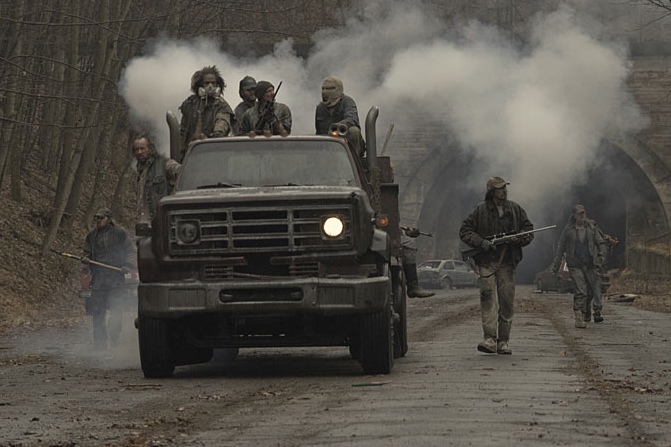They began to come upon from time to time small cairns of rock by the roadside. They were signs in gypsy language, lost patterans. The first he'd seen in some while, common in the north, leading out of the looted and exhausted cities, hopeless messages to loved ones lost and dead. By then all stores of food had given out and murder was everywhere upon the land. the world soon to be largely populated by men who would eat you children in front of your eyes and the cities themselves held by cores of blackened looters who tunneled among the ruins and crawled from the rubble white of tooth and eye carrying charred and anonymous tins of food in nylon nets like shoppers in the commissaries of hell. The soft black talc blew through the streets like squid ink uncoiling along a sea floor and the cold crept down and the dark came early and the scavengers passing down the steep canyons with their torches trod silky holes in the drifted ash that closed behind them silently as eyes. Out on the roads the pilgrims sank down and fell over and died and the bleak and shrouded earth went trundling past the sun and returned again as trackless and as unremarked as the path of any nameless sisterworld in the ancient dark beyond.-McCarthy 153
The first thing I'd like to point out is the part about the hopeless love messages. This seemed to imply that love was gone, it is now merely a fictional idea that is almost lost forever. Love is one of the qualities that distinguishes all humans and now that it is gone McCarthy has removed part of the human aspects from the survivors. They may be alive but the aren't quite human anymore. He reinforces the loss of human qualities shortly after when describing the men who would eat your kids in front of you. While there are a select few in the world now that practice cannibalism it is generally regarded as inhumane and immoral, but in this world it is just a mere way of life to survive. McCarthy even directly says they are living in hell. "...like shoppers in the commissaries of hell." The last line of this passage strikes me as a very powerful line. It seems to say that people died on pathways but the earth kept moving as if nothing happened on those pathways. I feel that McCarthy is trying to say that the world doesn't care if humans live or die because it will continue on regardless. The only things that care about humans are humans, and now that they are almost all gone they are worthless.
There was an oldfashioned drugstore there with a black marble counter and chrome stools with tattered plastic seats patched with electrical tape. The pharmacy was looted but the store itself was oddly intact. Expensive electronic equipment sat unmolested on the shelves. He stood looking the place over. Sundries. Notions. What are these? He took the boy's hand and led him out but the boy had already seen it. A human head beneath a cakebell at the end of the counter. Dessicated. Wearing a bellcap. Dried eyes turned sadly inward.-McCarthy 155
This passage begins with McCarthy's normal depressing imagery that describes this desolate world, but this time it ends a little differently-they find a decapitated human head in a cakebell. What I find very interesting is his use of the word "unmolested" as opposed to "not destroyed" or "still intact." Molestation is a very aggressive act and one that usually stirs up strong emotion within someone which I think was his goal with this passage. And very shortly after he describes this dried, repulsive human head in a cakebell which will definitely stir up something in everyone. A dried decapitated human head in a cakebell? McCarthy is really trying to emphasize the fact that most humans have become cannibals and to them people are like dessert, aka delicious. It felt to me as if the novel just froze for a moment as they looked into its eyes. This part is just one of the parts that really made me realize that almost everyone is dead and those that are left are doomed.




